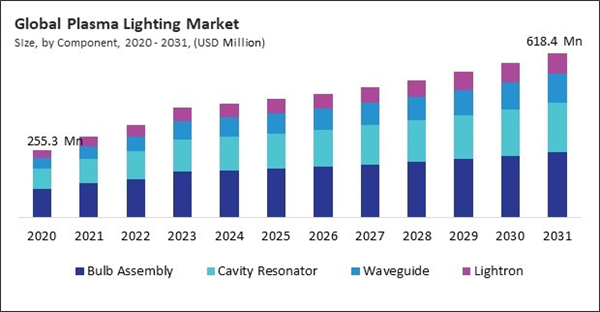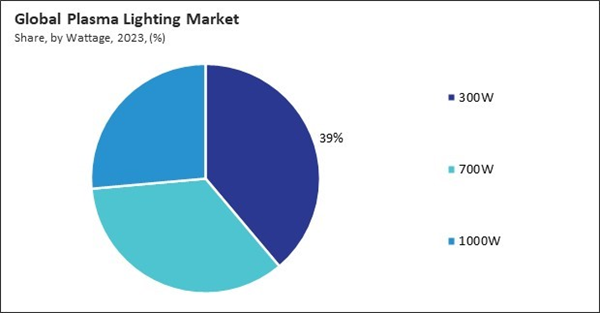Technological advancements and a growing focus on energy-efficient solutions in both public and private sectors fuel this expansion. In the United States and Canada, plasma lighting is widely adopted across manufacturing, automotive, and agriculture due to its energy-saving benefits and long lifespan. Therefore, the North America segment acquired 28% revenue share in the market in 2023.
Environmental regulations encouraging mercury-free and eco-friendly lighting solutions also contribute to its popularity in North America. The region’s push towards smart lighting systems for infrastructure and industrial applications aligns with the durability and adaptability of plasma lighting, helping it capture a significant portion of the market.
As urban areas grow, so does the need for smart and sustainable infrastructure solutions, a core focus of UN-Habitat’s Sustainable Urban Development initiative. Plasma lighting is an energy-efficient alternative that is consistent with environmental objectives, thereby contributing to urban sustainability objectives, as cities are responsible for over 70% of global greenhouse gas emissions. Therefore, all these factors will aid in the expansion of the market.
Additionally, the durability and longevity of plasma lighting technology have been greatly enhanced, making it ideal for environments with challenging conditions. The extended lifespan of the product reduces the necessity for frequent replacements and minimizes maintenance expenses, providing long-term value to industries that rely on consistent and dependable illumination. Thus, as these innovations continue, plasma lighting is poised to capture a larger market share.
However, individual consumers, such as homeowners or small businesses, often prioritize budget-friendly lighting solutions that offer immediate savings and low maintenance costs. While plasma lighting may offer long-term benefits in specific applications, the steep initial cost limits its appeal for everyday use. Hence, this reluctance, fueled by the high upfront price, makes plasma lighting a less attractive option and ultimately hampers its growth in the broader lighting sector.
Driving and Restraining Factors
Drivers
- Growing Demand in Horticulture
- Rapid Advances in Lighting Technology
- Rising Urbanization and Infrastructure Development
Restraints
- Substantially High Initial Costs
- Strong Competition from LEDs
Opportunities
- Use of Plasma Lighting in Smart City Initiatives
- Rising Awareness of Health Benefits
Challenges
- General Lack of Awareness among Potential End-Users
- Regulatory Policies and Efficiency Standards
Component Outlook
Based on component, the market is classified into lightron, waveguide, bulb assembly, and cavity resonator. The lightron segment garnered 12% revenue share in the market in 2023. The lightron segment leads due to its central role in generating high-intensity light efficiently, which is crucial for applications requiring powerful, uniform illumination. Its effectiveness in industrial facilities, stadiums, and large horticultural setups has driven demand. Furthermore, advances in lightron technology are increasing energy efficiency and extending product lifespan, making it an attractive choice for sectors prioritizing sustainability and operational cost savings.Wattage Outlook
On the basis of wattage, the plasma lighting market is divided into 300W, 700W, and 1000W. The 1000W segment recorded 26% revenue share in the market in 2023. The 1000W plasma lighting segment is driven by its capacity to deliver high-intensity, wide-coverage illumination, essential for large-scale applications like sports stadiums, industrial sites, and extensive outdoor areas. This segment serves sectors where powerful, long-lasting lighting is a priority, as it ensures visibility and safety in vast spaces.Application Outlook
By application, the market is segmented into highways, street lighting, & tunnels, industrial, sports & entertainment, horticulture, and others. The highways, street lighting, & tunnels segment witnessed 38% revenue share in the market in 2023. The demand for reliable and powerful lighting in transportation infrastructure drives the segment's growth. Plasma lighting’s ability to produce intense, uniform light over extended areas makes it ideal for highways, tunnels, and street lighting, enhancing visibility and safety.Regional Outlook
Region-wise, the market is analyzed across North America, Europe, Asia Pacific, and LAMEA. The Asia Pacific segment procured 42% revenue share in the market in 2023. The regional market's growth is driven by rapid industrialization, urban expansion, and significant investments in infrastructure across countries like China, Japan, and India. The high demand for energy-efficient and durable lighting solutions in these developing and urbanizing areas supports the adoption of plasma lighting, especially in large-scale public and industrial projects.List of Key Companies Profiled
- Gavita International B.V.
- BIRNS, Inc.
- Hive Lighting, Inc.
- Pure Plasma Lighting Inc.
- LG Electronics, Inc. (LG Corporation)
- Green de Corp.
- Solaronix SA
- Light Emitting Designs
- Stray Light Optical Technologies
Market Report Segmentation
By Component
- Bulb Assembly
- Cavity Resonator
- Waveguide
- Lightron
By
Wattage
- 300W
- 700W
- 1000W
By Application
- Highways, Street Lighting, & Tunnels
- Industrial
- Sports & Entertainment
- Horticulture
- Other Application
By Geography
- North America
- US
- Canada
- Mexico
- Rest of North America
- Europe
- Germany
- UK
- France
- Russia
- Spain
- Italy
- Rest of Europe
- Asia Pacific
- China
- Japan
- India
- South Korea
- Singapore
- Malaysia
- Rest of Asia Pacific
- LAMEA
- Brazil
- Argentina
- UAE
- Saudi Arabia
- South Africa
- Nigeria
- Rest of LAMEA
Table of Contents
Companies Mentioned
- Gavita International B.V.
- BIRNS, Inc.
- Hive Lighting, Inc.
- Pure Plasma Lighting Inc.
- LG Electronics, Inc. (LG Corporation)
- Green de Corp.
- Solaronix SA
- Light Emitting Designs
- Stray Light Optical Technologies










